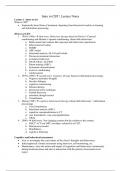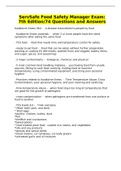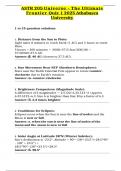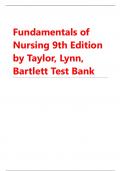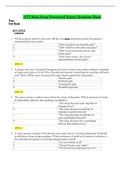Lecture 1 | intro to cbt
What is CBT?
• Empirically based form of treatment, departing from theoretical models on learning
and information processing.
History of CBT:
1. 1950’s-1960;s à first wave. Behaviour therapy based on Pavlov’s Classical
conditioning and Skinner’s operant conditioning, observable behaviours.
a. Behavioural interventions like exposure and behavioral experiments
b. behavioural activation
c. EMDR
d. ABC model
e. functional analysis, Sd, EO and S-delta
f. Person-environment interaction
g. avoidance behaviour
h. TRAP, TRAC, ACTION
i. Parent training (ABC)
j. Systematic desensitization
k. aversive conditioning
l. reinforcement.
2. 1970’s-1980’s à second wave. Cognitive therapy based on information processing.
a. Negative automatic thoughts
b. Socratic dialogue
c. cognitive restructuring
d. Schema therapy
e. downward arrow technique
f. Guided discovery
g. automatic thought record
h. Visiualitation.
3. During 1980’s à cognitive behavioural therapy (observable behaviour + information
processing).
a. Case formulations
b. functional analysis (ABC)
c. cognitive conceptualization in CT
d. case formulation= case conceptualization
e. CBTp
4. 2000’s à third wave. Not changing content but the relation to the content.
a. MBCT, ACT and DBT, nowadays referred to as CBT.
b. Dual process model
c. Mindfulness
d. cognitive defusions
Cognitive and behavioral assessment
• Aim: to investigate the exact nature of the client’s thoughts and behaviours.
• Initial approach: formal assessment using interview, self-monitoring, etc.
• Maintenance: asses the nature and impact of cognitions and behaviours continuously
during treatment phase and also in interaction with the patient (Assessment never
stops)
, Watch out for therapist drift; moving away from initially effective interventions bc you think
you know what you’re doing.
Behaviour therapy:
• Based on ABC model.
o Discriminative stimuli (Sd): Events or situations that elicit the behaviour and
predict reinforcement or punishment.
o Establishing operations (EO):
§ Factors changing the reinforcing or punishing properties of other
environmental events,
§ E.g.: hunger, thirst, craving, negative mood, thoughts, rules (e.g. if-then
statements)
§ Motivational factors.
§ S-delta: situations or circumstances in which the behaviour does NOT
take place.
Cognitive therapy:
• Thoughts (or cognitions) give meaning to a neutral stimulus and determine feelings
and behaviours
• Beliefs or schema’s are developed through (childhood) experiences and form a filter
• Identify thoughts
• Distinguish between automatic thoughts (automatically pop-up), (intermediate) beliefs
(set rules and attitudes you have about how the world works), and core beliefs
(schema’s about yourself, the world, and others).
• Challenge and change thoughts
Cognitive behavioural therapy levels:
• Most specific (movie-like)
o Topographical analyses (chain of behaviors; “take me through the situation;
what happened, where, with who, etc.?”))
• On the level of problem behavior
o Functional analysis in BT (describing antecedents (Sd / EO) – behaviour– pos
and neg consequences)
o Cognitive conceptualisation in CT (core belief, beliefs, situation, automatic
thoughts, reactions (emotional, physiological, behavioural)
• On the level of an overview of problem areas and their interactions / causal relations
o Case formulation / Holistic theory
Third wave CBT:
• Mindfulness-based cognitive therapy (MBCT): Non-judgemental observation of
present experiences. Thoughts can be observed. Meditation.
• Acceptance and commitment therapy (ACT):
o Acceptance: Willingness to stay in contact with aversive experiences
o Commitment to life values and goals
o Cognitive defusion: not change content of the thoughts, but the relation with
the thoughts
• Dialectic Behaviour Therapy (DBT)
o Change unhelpful ways of thinking and behaving, while accepting who youare
at the same time.


